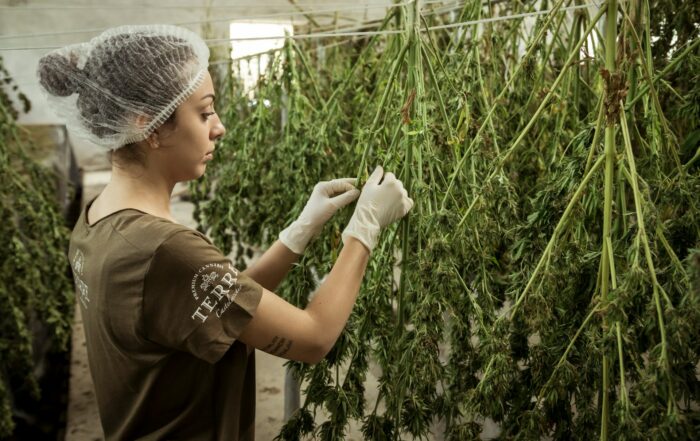Types of Workers’ Compensation Coverage for the Cannabis Industry
What Types of Coverage Are Available?
Cannabis businesses often need multiple insurance coverages, which may include general liability, professional liability, and cannabis-specific workers’ compensation. Each provides essential protection based on the nature of the work:
- General Liability Insurance: Covers third-party claims related to bodily injury or property damage, which can be critical for cannabis businesses that serve the public.
- Professional Liability Insurance: Protects against claims of negligence or errors in professional services, especially relevant to testing labs and consulting.
- Workers’ Compensation Insurance: Required in most states, this coverage protects cannabis employees and ensures medical expense coverage, wage replacement, rehabilitation, and disability benefits for work-related injuries.
What Are the Core Benefits of Workers’ Compensation for Cannabis Workers?
Workers’ compensation in the cannabis industry provides critical benefits, including coverage for medical expenses, wage replacement, rehabilitation, and disability benefits. These benefits not only protect employees but also help maintain business continuity by minimizing legal and financial disruptions due to workplace injuries.
Determining Workers’ Compensation Costs in Cannabis Operations
Factors That Influence Workers’ Comp Premiums in Cannabis
Workers’ compensation costs in cannabis vary by factors such as business size, job classifications, risk exposure, and claims history. For instance, roles involving heavy machinery, hazardous chemicals, or long hours of repetitive tasks may have higher premiums due to increased risk.
- Experience Rating Impact: The experience rating reflects the company’s previous workers’ comp claims. A better claims history lowers premiums, incentivizing cannabis businesses to maintain robust safety protocols.
- Job Classification Codes: Accurate job classification for each cannabis role, from budtenders to extraction technicians, ensures appropriate premiums and compliance with industry standards.
How Can Cannabis Companies Manage Workers’ Comp Costs?
Implementing strong safety programs can reduce workplace injuries and, consequently, lower workers’ compensation costs. Cannabis businesses can establish protocols like ergonomic workstations, personal protective equipment (PPE) for handling chemicals, and regular safety training.
Conducting Payroll Audits to Optimize Premiums
Accurate payroll reporting and periodic payroll audits help cannabis businesses avoid overpaying or underpaying for workers’ compensation. Audits align premium calculations with actual payroll and classifications, ensuring fair premiums that reflect workforce dynamics.
Securing Cannabis Workers’ Compensation: Process and Key Steps
Steps to Obtain Workers’ Compensation for Cannabis Businesses
Securing cannabis-specific workers’ compensation involves gathering detailed information, including job roles, safety protocols, and previous claims. Working with an insurance provider familiar with cannabis industry risks can streamline the process and help ensure compliance.
- Application Requirements: Cannabis businesses will typically need to provide payroll figures, job classifications, claims history, and details about safety measures.
- Choosing a Cannabis-Specialized Insurance Carrier: Partnering with insurance providers who understand cannabis risks can help ensure the right coverage. These carriers often have specialized policies tailored to unique cannabis industry risks.
Anticipating Potential Challenges in Cannabis Workers’ Comp Insurance
Due to regulatory differences, cannabis companies may face challenges such as finding cannabis-compliant carriers or securing affordable coverage. Working with brokers knowledgeable in cannabis can simplify the process, helping navigate state-specific compliance requirements and finding the best options for comprehensive coverage.
Industry Verticals in Cannabis and Coverage Needs
Understanding Cannabis Industry Verticals and Coverage Requirements
Each cannabis industry sector, from cultivation to retail, has distinct hazards and insurance needs. Here’s how workers’ compensation considerations vary across these verticals:
- Cultivation and Processing: Workers face risks from equipment use, ergonomic strain, and exposure to chemicals. Specialized workers’ compensation addresses risks like respiratory issues and repetitive injuries.
- Extraction and Testing: Employees handling solvents or chemicals in extraction or testing labs require coverage for potential chemical burns, inhalation risks, and equipment-related injuries.
- Retail (Dispensaries): Retail workers are prone to ergonomic strain and may require coverage for customer interactions, handling cash, or inventory tasks.
Cannabis Compliance and Regulatory Requirements
Each cannabis sector may be subject to state-specific workers’ compensation regulations. Compliance requires cannabis businesses to stay updated on their state’s cannabis laws, safety regulations, and required training for industry-specific risks.
Choosing the Right Workers’ Compensation Provider for Cannabis Businesses
Key Considerations for Cannabis Workers’ Comp Providers
When selecting an insurance provider, cannabis businesses should prioritize carriers with experience in the industry, financial stability, a strong claims handling process, and the ability to customize policies for cannabis risks.
Claims Handling and Cannabis Industry Knowledge
Efficient claims management ensures that injured workers receive prompt care and benefits. A provider with experience in cannabis can facilitate smooth claims handling, manage industry-specific injuries, and mitigate disputes or delays.
Importance of Financial Stability in an Insurance Provider
Financial stability is vital for workers’ compensation providers. It ensures that they can fulfill claims payments over time, a reassurance for cannabis businesses that need dependable coverage for their workforce.
FAQ: Cannabis Industry Workers’ Compensation
- How can cannabis businesses ensure workers’ compensation compliance? Compliance involves understanding state-specific cannabis regulations, properly classifying roles, and maintaining adequate coverage levels based on job risk and safety measures.
- How are premiums calculated for cannabis businesses? Premiums are calculated based on factors such as payroll, job classifications, and the business’s claims history. Effective risk management and accurate reporting can help manage these costs.
- What are the legal obligations for cannabis employers? Cannabis employers must meet their state’s specific workers’ compensation requirements, maintain safe work environments, accurately classify roles, and ensure prompt reporting and handling of claims.







